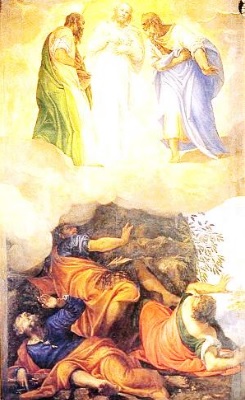(Mk ix 7a NEB)
by Rev. Antony W. Ball

Clouds usually get a ‘bad press’ in our climate – although maybe the recent heatwave and parched gardens will change that – but in hot, dry climates they are welcomed. To the Israelites clouds have always had an extra significance. Once Moses had led the Israelites out of slavery in Egypt, to spend the next forty years in the Arabian deserts…
…all the time the LORD went before them,
by day a pillar of cloud to guide them on their journey,
by night a pillar of fire to give them light,
so that they could travel night and day.
The pillar of cloud never left its place in front of the people by day,
nor the pillar of fire by night.
(Ex xiii 21,22, NEB)
So, for the Israelites, a cloud became a sign of God’s presence with them. When Jesus was transfigured, Peter, James and John might well have seen the cloud which overshadowed them as just such a sign of God’s presence, although I doubt it would have been quite as overwhelming or intimidating as the above painting suggests – none of those three apostles looks as if he’s about to say (as Peter did) “Master, how good it is that we are here!” (Lk ix 33b NEB)
We should all be on the lookout to see signs of God’s presence with us. Some see such signs in…
- – the beauties of creation and nature – a spectacular mountain scene, or the universe seen through a telescope, or simply a human baby
- – or in the depth of love which two people have for each other, being a faint reflection of the love which God has for both of them
- – or in the beauties of poetry or music – sorry, but I don’t personally share that one, although I recognize many people do
- – or in the beauties of a scientific or mathematical theory which remains hidden until one extraordinary mind reveals it
- – or in the beauties of scripture through which the simplest story (like a parable) can reveal profoundly deep truths.
It shouldn’t surprise us that there are so many different signs (far more than the few I’ve listed above) because God made each and every one of us different and the different lives we lead compound those differences and influence how we respond to them. For example, even having Christian parents can ‘work both ways’ to become either a positive example, giving us encouragement and inspiration, or it can become a resented, restraining restriction against which to rebel.
What matters is that we’re constantly on the lookout for such signs and, when we do encounter them, recognise them for what they are: evidence that our lives have a far deeper meaning than anything we can observe or possess.
During the transfiguration, Peter asked whether he should build three shelters – one each for Jesus, Moses and Elijah – but we can’t ‘hang onto’ God in that kind of way. Instead we must trust that He is always with us.